THE FATEFUL PRONOUNCEMENT; FEAR IS FAITH IN REVERSE; PETER’S DENIALS
Today’s reading in Numbers 14 marks a dramatic turning point in the history of the people of Israel in the wilderness.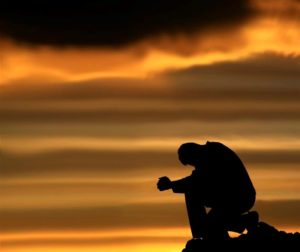
It is the day when the Lord pronounced chastisement upon the entire generation of those over twenty years of age, apart from Joshua and Caleb, and pledges that they shall not enter into the promised land.
“Surely all the men who have seen My glory and My signs which I performed in Egypt and in the wilderness, yet have put Me to the test these ten times and have not listened to My voice, [23] shall by no means see the land which I swore to their fathers, nor shall any of those who spurned Me see it” (Numbers 14:22-23).
The account of this incident is given by the Psalmist centuries later, and picked up again in the New Testament Book of Hebrews. The Psalmist signals and the writer of Hebrews proclaims that there is a present danger of ‘hardening your heart to the Lord’ that can keep us from “A Promised Rest” in Christ. That rest is greater than the one promised in the conquest of Canaan.
Psalm 95:11 (referring to the incident in Numbers 14)
“Therefore, I swore in My anger,
Truly they shall not enter into My rest.”
Hebrews 3:12-14 Take care, brethren, that there not be in any one of you an evil, unbelieving heart that falls away from the living God. [13] But encourage one another day after day, as long as it is still called “Today,” so that none of you will be hardened by the deceitfulness of sin. [14] For we have become partakers of Christ, if we hold fast the beginning of our assurance firm until the end…
This is the tenth incident that provoked the Lord’s anger. The number 10 represents the completion of judgment in Scripture. We have seen this in the Ten Plagues that fell upon Egypt in judgment for Pharaoh’s hardness of heart. The Ten Commandments reflect the judicially complete claim upon Israel that pronounces all guilty and in need of redemption. The judgment of the flood came with Noah, the tenth patriarch.
Let’s review the ten incidents that angered the Lord:
- Exodus 14:11-12 (At the Red Sea)
Then they said to Moses, “Is it because there were no graves in Egypt that you have taken us away to die in the wilderness? Why have you dealt with us in this way, bringing us out of Egypt? [12] Is this not the word that we spoke to you in Egypt, saying, ‘Leave us alone that we may serve the Egyptians’? For it would have been better for us to serve the Egyptians than to die in the wilderness.”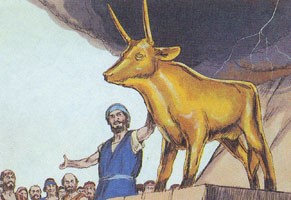
- Exodus 15:24 (At Marah)
So, the people grumbled at Moses, saying, “What shall we drink?”
- Exodus 16:3 (At the Desert of Sin)
The sons of Israel said to them, “Would that we had died by the Lord’s hand in the land of Egypt, when we sat by the pots of meat, when we ate bread to the full; for you have brought us out into this wilderness to kill this whole assembly with hunger.”
- Exodus 16:20 (Disobedience in Collecting Manna)
But they did not listen to Moses, and some left part of it until morning, and it bred worms and became foul; and Moses was angry with them.
- Exodus 16:27-29 (Collecting Manna on the Sabbath)
It came about on the seventh day that some of the people went out to gather, but they found none. [28] Then the Lord said to Moses, “How long do you refuse to keep My commandments and My instructions? [29] See, the Lord has given you the sabbath; therefore, He gives you bread for two days on the sixth day. Remain every man in his place; let no man go out of his place on the seventh day.”
- Exodus 17:2-3 (Complaining against God for lack of water at Rephidim; renamed Massa and Meribah)
Therefore, the people quarreled with Moses and said, “Give us water that we may drink.” And Moses said to them, “Why do you quarrel with me? Why do you test the Lord?” [3] But the people thirsted there for water; and they grumbled against Moses and said, “Why, now, have you brought us up from Egypt, to kill us and our children and our livestock with thirst?”
- Exodus 32:7-9 (Worshiping the Golden Calf)
Then the Lord spoke to Moses, “Go down at once, for your people, whom you brought up from the land of Egypt, have corrupted themselves. [8] They have quickly turned aside from the way which I commanded them. They have made for themselves a molten calf, and have worshiped it and have sacrificed to it and said, ‘This is your god, O Israel, who brought you up from the land of Egypt!’ [9] The Lord said to Moses, “I have seen this people, and behold, they are an obstinate people.”
- Numbers 11:1-2 (Complaining at Taberah)
Now the people became like those who complain of adversity in the hearing of the Lord; and when the Lord heard it, His anger was kindled, and the fire of the Lord burned among them and consumed some of the outskirts of the camp. [2] The people therefore cried out to Moses, and Moses prayed to the Lord and the fire died out.
- Numbers 11:4 (Complaining about lack of meat)
The rabble who were among them had greedy desires; and also the sons of Israel wept again and said, “Who will give us meat to eat?”
- Numbers 14:1-4 (Failing to Trust God about the Promised Land)
Then all the congregation lifted up their voices and cried, and the people wept that night. [2] All the sons of Israel grumbled against Moses and Aaron; and the whole congregation said to them, “Would that we had died in the land of Egypt! Or would that we had died in this wilderness! [3] Why is the Lord bringing us into this land, to fall by the sword? Our wives and our little ones will become plunder; would it not be better for us to return to Egypt?” [4] So they said to one another, “Let us appoint a leader and return to Egypt.”
FEAR IS FAITH IN REVERSE 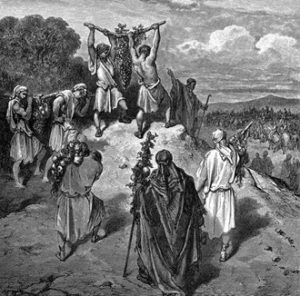
The report from the ten spies radically changed the perspective of the congregation of Israel in the wilderness to the degree that they want to go back to Egypt! Fear gripped their ability to reason. Grumbling spread throughout the camp. The purpose and work of God was called into question. Moses and Aaron are considered guilty for misleading them. Soon the whole congregation forgets the great event of the Passover, which they had significantly commemorated months before, and they regret having ever eaten the divinely ordained meal and taken the journey.
“Why is the LORD bringing us into this land, to fall by the sword? Our wives and our little ones will become plunder; would it not be better for us to return to Egypt?” Numbers 14:3 (NASB)
The Lord takes note of their words.
Does fear ever cause your recollection of God’s promises and provisions in your life to vaporize? Have you stood in fear before problems that outsize you and watch them grow into formidable giants? Be careful not to allow fear to revise your history, paralyze your present, and retreat from what God has promised in your future. Like Caleb and Joshua, learn to see every difficulty in the light of God’s faithful presence (He is here), His power (He is able) and His promises (He will bring you into your inheritance).
With each complaint, the Israelites further shifted their gears from ‘forward in faith’ to ‘reverse in fear’. As their distaste for life in the wilderness grew, so did their hunger for their recollections of the leeks and cucumbers of their past. Soon their imaginations were on a sentimental journey to Egypt. Imagined pleasures overshadowed the reality of their former hardships. No one spoke of the scars on their backs from the cruel whips of their taskmasters. Life in Egypt was far better than this.
God is blamed for their current conditions and so are their leaders. They want to stone Moses, Aaron, Joshua and Caleb. They want to choose a new leader to take them back where they came from (Numbers 14:2, 4).
The crowd was ready to stone their leaders and would have done so had the glory of the Lord not intervened.
At first the Lord threatens to destroy all the people (as one man) for their sin of unbelief and start over with Moses, as He did with Abraham, and from him make a greater nation.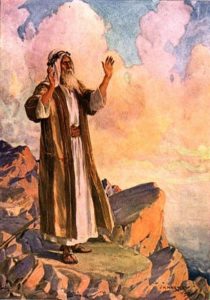
Moses intercedes for the life of his people, that the LORD’S name and power be vindicated among the nations. Moses makes His plea on the basis of the revelation of God’s character (Exodus 34;6-7; Numbers 14:18).
“Pardon, I pray, the iniquity of this people according to the greatness of Your lovingkindness, just as You also have forgiven this people, from Egypt even until now” (14:19).
Then the Lord says something quite amazing; something that indicates that indeed Moses and the Lord did speak with one another as a man speaks with his friend.
20 So the LORD said, “I have pardoned them according to your word” Numbers 14:20 (NASB).
It is important to take God at His Word, but also remember that He is ready to take us at our word.
He forgives the sins of His people, yet chastises their unbelief. All those who are over twenty years old will not enter into the victorious possession of the Promised Land. They will perish in the wilderness. For each of the 40 days of unbelief when they spied out the Promised Land in the light of their fears instead of God’s Word, they would bear the guilt in a year of wandering in the wilderness. For 40 years they would wander and know the Lord’s opposition.
The Lord also tells them that it would be as the people said. He was listening. They would fall in the wilderness, but not at the hands of the enemy as they expected. God would cause them to fall. But instead of their children being taken away from them as plunder, they would enter into the land. They would spend the rest of the forty years in the wilderness as shepherds on account of their father’s sins.
Judgment also fell upon the ten spies who gave the evil report, all of whom died with the plague.
On the next day, the people, grieving the news of God’s punishment, want to make amends, take courage, and enter into Canaan to face the giants. Moses tells them that their plan won’t work. If they proceed in their own strength, they will be struck down by the Canaanites. They went without the Lord’s permission, His presence (represented by the ark of the covenant) or His appointed leader, Moses, and were defeated.
NEW TESTAMENT READING: Mark 14:53-72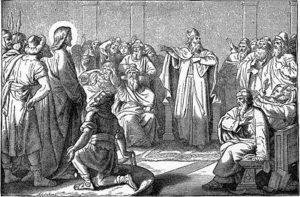
The Sanhedrin was the ruling body of 71 religious leaders in Jerusalem. They were so anxious to convict Jesus of a crime that they were searching for those who would testify against Him.
There were two interviews in Jesus’ trial before the Sanhedrin. The first, held in the middle of the night, was illegal, as it was against their customs to try a person at night (John 18:12-24).
The second phase of the trial before the Sanhedrin was at daybreak (Luke 22:66-71).
The Sanhedrin were attempting to use the testimony that Jesus had claimed he would destroy the temple at Jerusalem to condemn him to death, but the testimony was not consistent (Mark 14:59). Jesus did not threaten to destroy a temple made with hands, but pointed to another temple, the temple of His body, which would be killed and raised again.
Jesus answered them, “Destroy this temple, and in three days I will raise it up” (John 2:19).
The High Priest asks the big question: “Are you the Christ?” 
62 And Jesus said, “I am; and you shall see THE SON OF MAN SITTING AT THE RIGHT HAND OF POWER, and COMING WITH THE CLOUDS OF HEAVEN.” Mark 14:62 (NASB)
It was this admission, that Jesus was the Christ, that gave the priests the cause they were looking for to condemn Him to death. They charged Him with blasphemy for claiming to be the Son of God.
Note that after Jesus is arrested, Peter denies Jesus three times, as Jesus predicted:
- One of the servant girls, while Peter was warming himself by the fire
Peter said, “I neither know nor understand what you are talking about.” (Mark 14:68)
- When the servant girl points him out to bystanders on the porch
Peter again denies it. (Mark 14:70)
- The bystanders accused him of being one of the disciples
Peter begins to curse and swear, “I do not know this man you are talking about.” (Mark 14:71)
When the rooster crows the second time, Peter remembers that Jesus predicted Peter would deny Him three times. Peter begins to weep.
Earlier Jesus had said:
30 “Truly I say to you, that this very night, before a rooster crows twice, you yourself will deny Me three times.” Mark 14:30 (NASB)
God’s mercy to Peter, which we shall see in his full restoration to being a faithful apostle of Christ, should be an encouragement to us all.
(The oil on canvas painting on the left is “The Denial of Saint Peter” by Gerrit van Honthorst, c. 1623, and is housed at the Minneapolis Institute of Arts.)
READING FROM THE PSALMS
PSALM 53:1-6
Psalm 53 echoes what we heard in Psalm 14 with some minor differences. Verse 6 of Psalm 14 is replaced with an addition to verse 5. It is made clear that the people who were being put to shame were the afflicted counselors whom God had rejected.
In Psalm 53, no longer do we read, “God is with the righteous generation” (which was in verse 5 of Psalm 14). In Psalm 14 verse 6 the Psalmist used the tetragrammaton (YHWH- LORD) referring to the covenant keeping God who is deeply interested and involved in the welfare of His people (‘Yahweh’ is his refuge). However, in Psalm 53, the verse has changed. Instead of the Name (YHWH) that refers to the relational covenant-keeping God, the Psalmist uses ‘Elohim’, the Name of God that refers to His almighty power that sustains the universe. This suggests further spiritual declension among God’s people.
So Psalm 53 is a slightly expanded version of Psalm 14. The first verses in both Psalms speak of the fool who claims to be an atheist. The Hebrew word used here for fool is ‘nabal’. It is not the word that is used of someone who is uneducated or stupid. It is a word that describes moral senselessness. It is not a lack of evidence of God’s existence that drives a person’s atheism, although that may be their claim, but it is their insistence on moral autonomy, that they are answerable only to themselves. They assume the position of final authority, ignoring the evident contradictions and deceit in their own thought life and behavior. They lack moral sensibility. The evangelist Billy Sunday used to say that atheists can’t find God for the same reason criminals can’t find policemen!
The second verse moves from ‘practical atheism’ in particular to the human condition in general. The Apostle Paul quotes from these Psalms in Romans Chapter 3 as summaries of human depravity:
Romans 3:10-12 (NIV) 10 As it is written: “There is no one righteous, not even one;
11 there is no one who understands, no one who seeks God.
12 All have turned away, they have together become worthless; there is no one who does good, not even one.”
The Psalm ends in verses 5 and 6 with David’s prayer for the Promised Messiah who will save his people from their sins and restore them to function with a new nature that is joyfully submitted to the rule of God.
THE PROVERB FOR TODAY
Proverbs 11:4 (NIV) 4 Wealth is worthless in the day of wrath, but righteousness delivers from death.
The righteousness that we need to deliver us from death (which is the wages of our sin- Romans 6:23) is the righteous act of God accepting Jesus’ offering of a perfectly righteous life on our behalf and His righteously satisfying God’s justice that demands full payment for sin. This righteousness is a free gift that is accepted by faith (Romans 1:16-17; 3:21-25; 9:30; 10:6).
Wealth, such as silver and gold, will be useless when you are called to give an account before the throne of God. Only the righteousness of the finished work of Christ on behalf of guilty sinners can put us in the right with an Almighty, all holy God.
1 Peter 1:18-19 (NIV) 18 For you know that it was not with perishable things such as silver or gold that you were redeemed from the empty way of life handed down to you from your forefathers, 19 but with the precious blood of Christ, a lamb without blemish or defect.
PRAY FOR THE NATIONS
TODAY WE PRAY FOR BHUTAN 
Challenge for Prayer
Bhutan is one of the world’s least evangelized nations. The continued isolationist policies of the government combined with the highly significant role of the Buddhist monarchy further reinforce the hold of tantric Vajrayana Buddhism, complete with the strong occultic/demonic influence of pre-Buddhist Bon animism. Pray for true spiritual liberation for this land of the Dragon (Druk Yul). Pray for King Wangchuk and his salvation.
The Tibetan/Himalayan peoples comprise the majority population, with the Bhutanese people cluster numbering 50% of the population. They are strongly Buddhist, and Christians among them number only a few hundred. These scattered believers are limited to small fellowships at best; most have faced varying degrees of persecution or social ostracism. Among the five largest peoples (Dzongkha, Tshangla, Lepcha, Kheng, Gurung), only the Lepcha have any significant Christian population. Pray for the emergence of a vital witnessing fellowship in every ethnic group of the Bhutanese.
Bhutan was effectively closed to all Christian witness until 1965. This was followed by 25 years of slight relaxation, during which Indian and other expatriates were able to witness. Since 1990, restrictions have increased. Pray for the growth of the church in this land.
PRAYER: Lord God, we have been reminded of the foolishness and fickleness of the human heart. Forgive us of our wayward thoughts and deeds. Thank You for the good news that Your Son, Jesus, perfectly satisfied the demands of justice when He offered the full payment of our sin debt on the cross. We ask that You fill us with Your Spirit and enable us to walk in the light of Who You Are and All that You have done on our behalf! Thank You Jesus!
Pastor David
So, naturally, we proclaim Christ! We warn everyone we meet, and we teach everyone we can, all that we know about him, so that, if possible, we may bring every man up to his full maturity in Christ. (Colossians 1:28, J.B. Phillips paraphrase)
New Life Community Church, Concord, MA 10742
www.newlife.org
